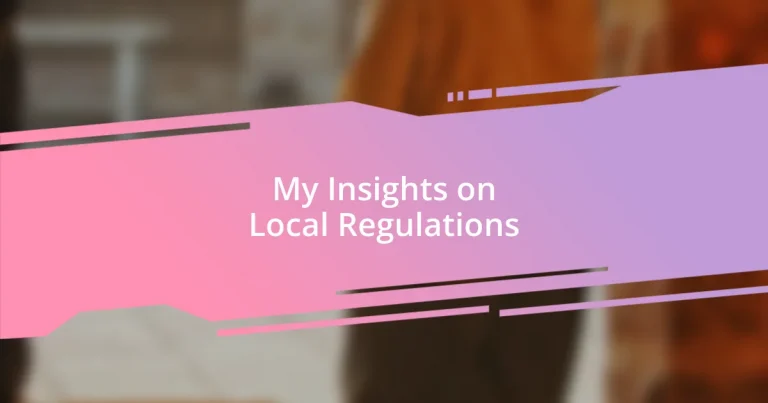Key takeaways:
- Understanding local regulations is essential for businesses to avoid penalties, foster community connections, and align with sustainable practices.
- Common local regulations include zoning laws, health and safety codes, and building codes, all aimed at ensuring safety and compliance in communities.
- Staying informed about local changes through government websites, local chambers of commerce, and community engagement helps businesses navigate regulatory challenges effectively.
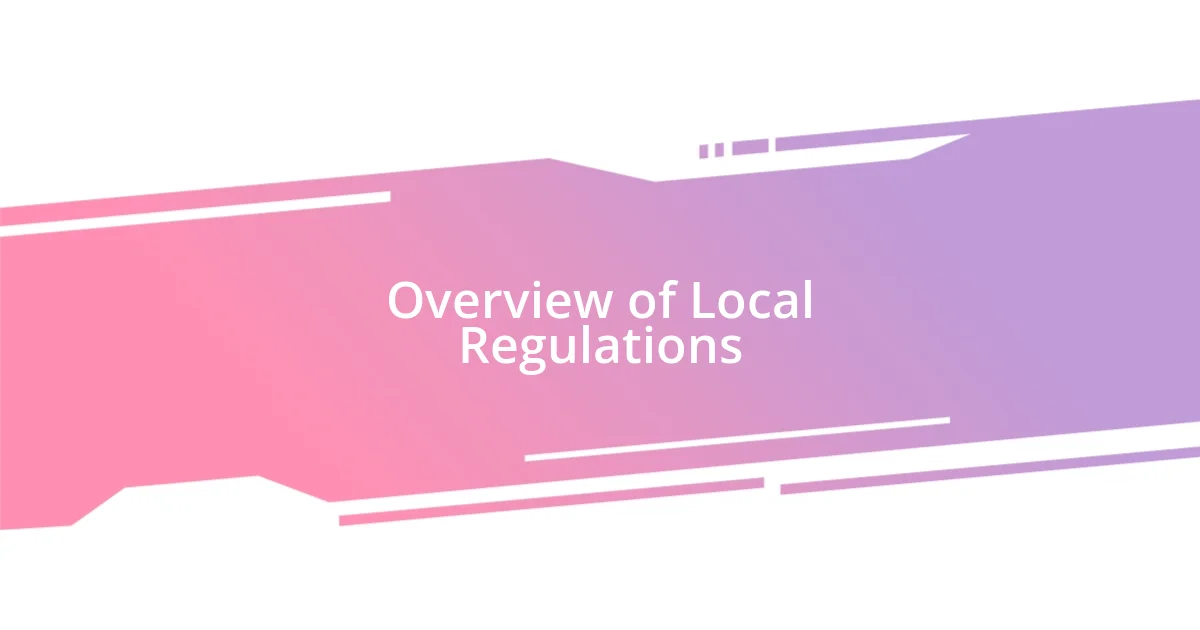
Overview of Local Regulations
Local regulations can often feel like a maze, don’t they? Each community has its own set of rules and ordinances that can change how businesses operate and how residents live. I remember navigating the complex zoning laws when I first started my own business; understanding the nuances of what was permitted in my area was a daunting task, but it was essential for success.
It’s fascinating how local regulations are shaped by community needs and values. For instance, in my neighborhood, there’s a strong push for sustainable development, which has led to strict regulations on building materials and energy use. This not only impacts local businesses but also encourages residents to engage in more eco-friendly practices. Have you ever thought about how these regulations reflect our society’s priorities?
What strikes me most about local regulations is how they evolve over time. I’ve seen communities shift their focus based on changing demographics and environmental considerations. For example, when a new park was proposed in my area, local officials held several meetings to gather feedback, showcasing how regulations can be influenced by public input. Isn’t it intriguing how we can shape our environment through these local laws?
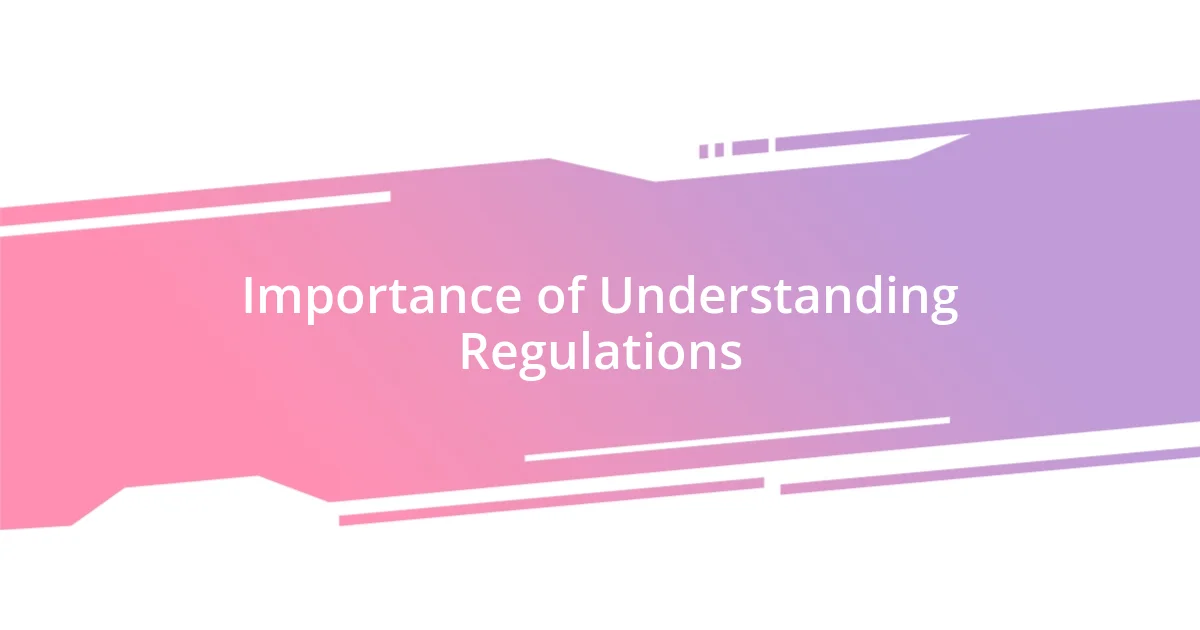
Importance of Understanding Regulations
Understanding local regulations is crucial for anyone wanting to thrive in their community. I remember when I moved to a new city, and I quickly learned that compliance with local codes wasn’t just bureaucratic red tape—it was a lifeline for my business. Navigating these rules helped me establish rapport with my neighbors, and I found that being compliant nurtured trust and goodwill.
Here are some key reasons why understanding regulations is so important:
- Avoiding Penalties: Non-compliance can lead to fines or legal trouble.
- Building Stronger Connections: Awareness of regulations can strengthen ties within the community.
- Enhancing Business Strategy: Regulations can provide insight into market trends and community values.
- Promoting Sustainability: Many regulations are geared toward environmental protection, aligning your goals with community priorities.
- Empowering Participation: Knowing the rules enhances your ability to advocate for changes that benefit everyone.
On another note, I’ve encountered instances where unfamiliarity with local laws stalled deserving projects. A friend of mine faced delays while renovating her cafe simply because she didn’t grasp the permitting process. This experience taught me how crucial it is to inform myself and others about local regulations—knowledge truly is power in these situations. By understanding regulations, we don’t just avoid pitfalls; we can actively participate in shaping the community we cherish.
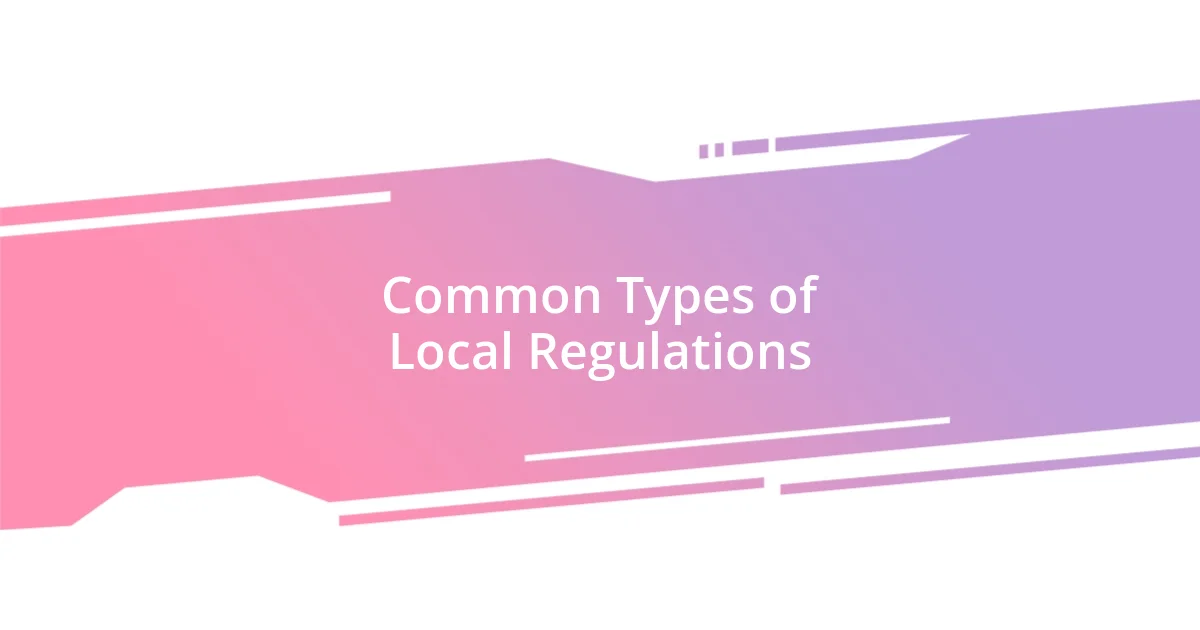
Common Types of Local Regulations
Local regulations encompass a variety of areas designed to maintain order and enhance safety within communities. Zoning laws, for example, govern how land can be used, whether for residential, commercial, or industrial purposes. I recall the moment I found out about a new zoning ordinance in my area; it meant that building an additional deck on my house required more than just a hammer and nails—and that little revelation changed my entire renovation strategy.
Another common type of local regulation is health and safety codes, which protect public welfare. Businesses, especially in the food industry, must comply with these crucial guidelines to safeguard their customers. When I first opened my café, I was surprised by the extensive health inspections we had to pass. Thinking back, those rigorous checks helped me ensure that my customers enjoyed their meals in a clean, safe environment. Doesn’t it reassure you to know that regulations are in place to protect our health?
Finally, building codes play a vital role in ensuring that structures are sound and safe. These regulations can be intricate, often requiring permits for modifications that you might not expect. For instance, when I hired contractors to remodel my office, they had to navigate a web of building codes. I remember the contractor saying, “We need to ensure everything is up to code, or we could face hefty penalties.” That made me realize just how important these regulations are—not just for compliance, but to foster a safe and sustainable environment for everyone.
| Type of Local Regulation | Description |
|---|---|
| Zoning Laws | Regulate land use—ensuring proper allocation for residential, commercial, and industrial purposes. |
| Health and Safety Codes | Set guidelines to safeguard public health, especially essential for food and service industries. |
| Building Codes | Ensure safety standards in construction—mandating proper permits and inspections. |
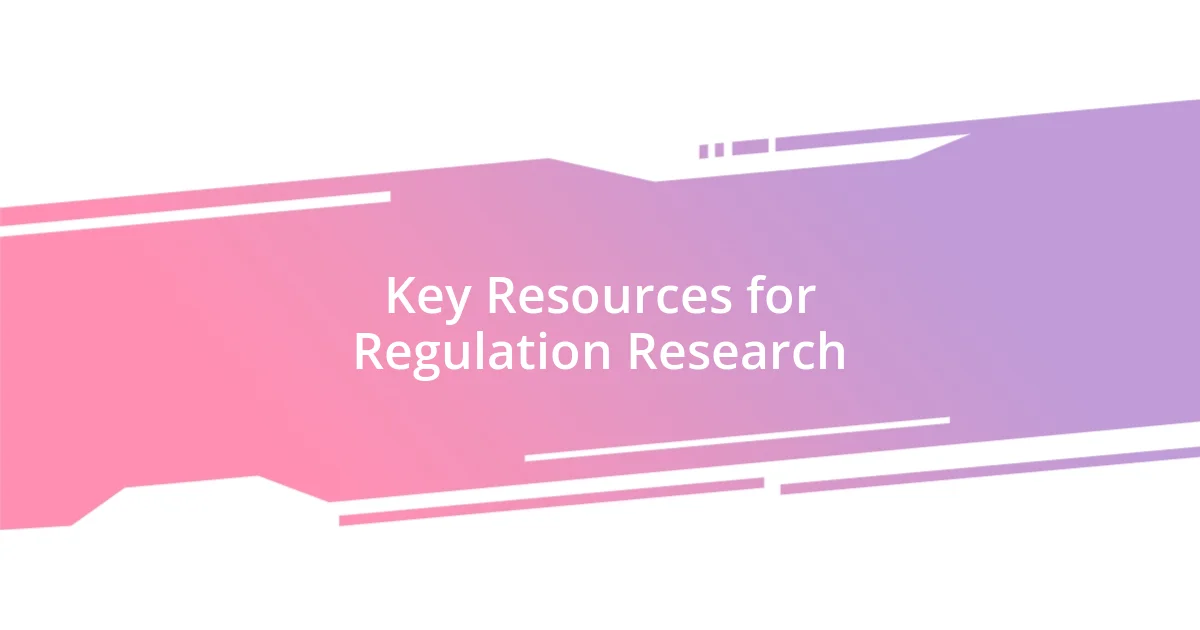
Key Resources for Regulation Research
Researching regulations can feel overwhelming, but there are some excellent resources that can simplify this process. Local government websites often provide a wealth of information, including zoning laws and recent amendments. I remember spending hours sifting through my town’s official site when I wanted to open my bakery. It was a treasure trove of resources that not only laid out the regulations clearly but also included contact info for local officials who could answer any lingering questions.
Another invaluable resource is the local chamber of commerce. They typically offer workshops, networking events, and insights into local regulations that can benefit business owners. I once attended a seminar hosted by our chamber, where an expert broke down complex regulations into manageable sections. It was enlightening! How many times have you struggled with legal jargon that feels like a different language? Having someone translate that into everyday terms can make all the difference in understanding and implementing these rules.
Additionally, joining local business associations can provide support and a collective voice for navigating regulations. In my journey as an entrepreneur, I found that these associations are not just about networking; they foster a sense of community where everyone shares insights and resources. One conversation can lead to discovering tips to streamline compliance processes. It’s this collaborative spirit that made me realize that I’m not alone in this journey—have you ever felt that sense of belonging when sharing experiences with like-minded individuals? Embracing these resources proves that while regulations may shape the framework, it’s our collective knowledge that empowers us to thrive.
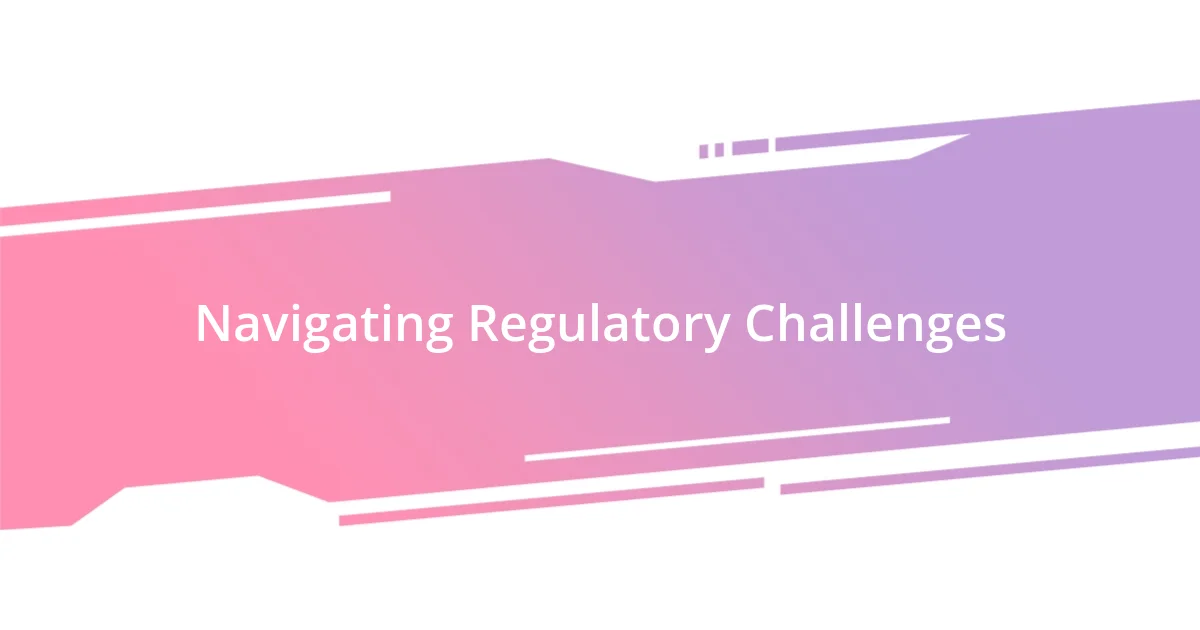
Navigating Regulatory Challenges
Navigating regulatory challenges can feel like wandering through a maze of rules and guidelines. I vividly remember the sense of frustration I felt when I discovered that the café I was planning needed not just a business license but also additional permits for outdoor seating. How was I supposed to know that? It taught me a valuable lesson: diligence in understanding local regulations can save both time and headaches down the line.
One of the biggest hurdles I’ve encountered is keeping up with ever-changing regulations. It’s like trying to hit a moving target! I once invested weeks preparing for a local zoning meeting only to find out that proposed changes had altered the landscape entirely. Staying informed requires a proactive effort, but believe me, it’s worth it when you realize you’re ahead of the curve rather than scrambling to catch up.
Collaboration can also be your greatest ally in overcoming regulatory obstacles. I remember reaching out to fellow local business owners for advice during a particularly challenging zoning issue. Their shared experiences provided clarity and helped me formulate a solid action plan that made compliance far less daunting. Isn’t it comforting to know that we can lean on one another in these situations? Ultimately, it’s this community support that turns regulatory challenges into manageable steps forward.
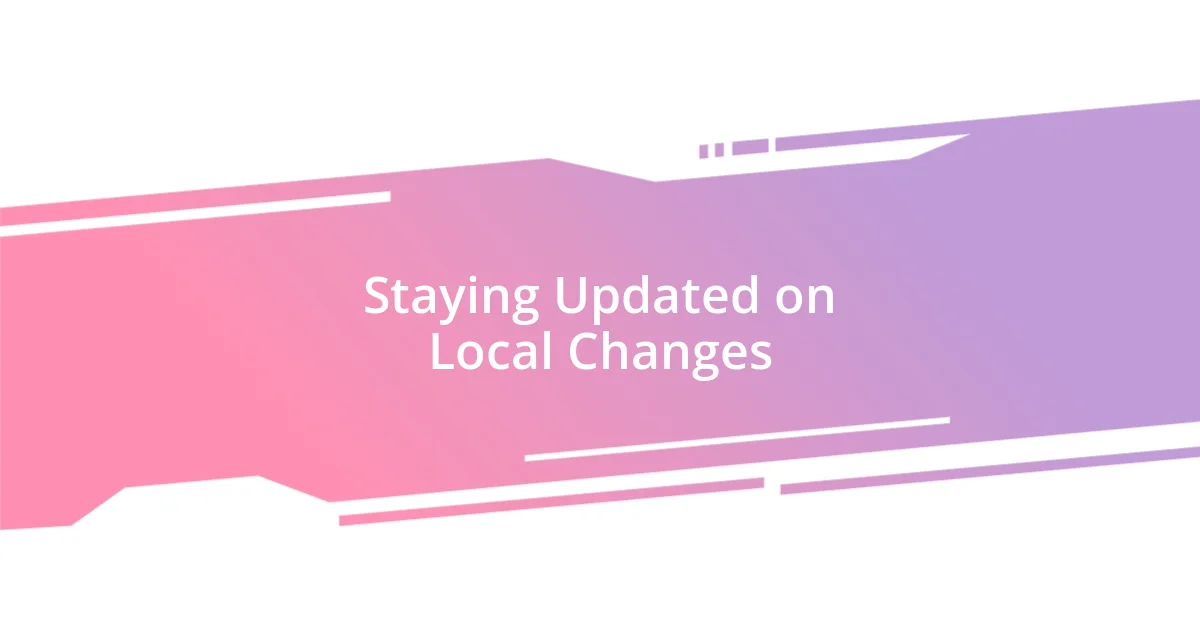
Staying Updated on Local Changes
Staying updated on local changes often requires me to tap into various channels. A few months ago, a neighbor mentioned a new city council meeting that focused on proposed changes I hadn’t heard about. I decided to attend, and it felt empowering to be in the loop. Have you ever stumbled upon information that completely changed your perspective? Engaging directly with local decision-makers not only sheds light on future developments but also allows me to voice my concerns, bringing a real sense of community involvement.
An effective strategy I’ve adopted is following local news outlets and social media accounts. I remember scrolling through my newsfeed when I stumbled upon a post about new environmental regulations affecting small businesses in my area. It felt like finding a hidden gem; that snippet of information prompted me to join an online forum where fellow business owners discussed potential impacts. Isn’t it fascinating how a single post can lead to deeper discussions and new insights? By being proactive on these platforms, I can anticipate changes before they fully take shape.
Lastly, I find that subscribing to newsletters from local advocacy groups has been incredibly beneficial. I still recall the moment I received an email about a newly proposed tax incentive for small businesses. It felt like someone had handed me a golden ticket! Those newsletters often distill complex information into bite-sized updates, making it easier to stay informed without feeling overwhelmed. When was the last time a small piece of information significantly impacted your business plans? It’s a simple yet effective way to keep me engaged and ready for what’s next.












